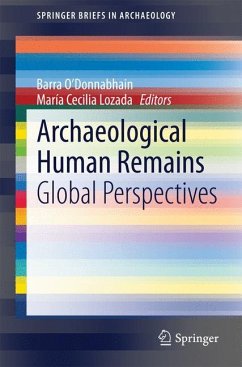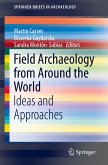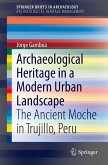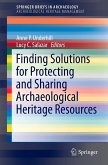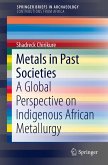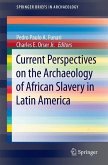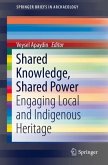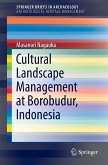Archaeological Human Remains
Global Perspectives
Herausgegeben:O'Donnabhain, Barra; Lozada, María Cecilia
Archaeological Human Remains
Global Perspectives
Herausgegeben:O'Donnabhain, Barra; Lozada, María Cecilia
- Broschiertes Buch
- Merkliste
- Auf die Merkliste
- Bewerten Bewerten
- Teilen
- Produkt teilen
- Produkterinnerung
- Produkterinnerung
This volume addresses the directions that studies of archaeological human remains have taken in a number of different countries, where attitudes range from widespread support to prohibition. Overlooked in many previous publications, this diversity in attitudes is examined through a variety of lenses, including academic origins, national identities, supporting institutions, archaeological context and globalization. The volume situates this diversity of attitudes by examining past and current tendencies in studies of archaeologically-retrieved human remains across a range of geopolitical…mehr
Andere Kunden interessierten sich auch für
![Field Archaeology from Around the World Field Archaeology from Around the World]() Field Archaeology from Around the World52,99 €
Field Archaeology from Around the World52,99 €![Archaeological Heritage in a Modern Urban Landscape Archaeological Heritage in a Modern Urban Landscape]() Jorge GamboaArchaeological Heritage in a Modern Urban Landscape37,99 €
Jorge GamboaArchaeological Heritage in a Modern Urban Landscape37,99 €![Finding Solutions for Protecting and Sharing Archaeological Heritage Resources Finding Solutions for Protecting and Sharing Archaeological Heritage Resources]() Finding Solutions for Protecting and Sharing Archaeological Heritage Resources37,99 €
Finding Solutions for Protecting and Sharing Archaeological Heritage Resources37,99 €![Metals in Past Societies Metals in Past Societies]() Shadreck ChirikureMetals in Past Societies44,99 €
Shadreck ChirikureMetals in Past Societies44,99 €![Current Perspectives on the Archaeology of African Slavery in Latin America Current Perspectives on the Archaeology of African Slavery in Latin America]() Current Perspectives on the Archaeology of African Slavery in Latin America37,99 €
Current Perspectives on the Archaeology of African Slavery in Latin America37,99 €![Shared Knowledge, Shared Power Shared Knowledge, Shared Power]() Shared Knowledge, Shared Power41,99 €
Shared Knowledge, Shared Power41,99 €![Cultural Landscape Management at Borobudur, Indonesia Cultural Landscape Management at Borobudur, Indonesia]() Masanori NagaokaCultural Landscape Management at Borobudur, Indonesia37,99 €
Masanori NagaokaCultural Landscape Management at Borobudur, Indonesia37,99 €-
-
-
This volume addresses the directions that studies of archaeological human remains have taken in a number of different countries, where attitudes range from widespread support to prohibition. Overlooked in many previous publications, this diversity in attitudes is examined through a variety of lenses, including academic origins, national identities, supporting institutions, archaeological context and globalization. The volume situates this diversity of attitudes by examining past and current tendencies in studies of archaeologically-retrieved human remains across a range of geopolitical settings. In a context where methodological approaches have been increasingly standardized in recent decades, the volume poses the question if this standardization has led to a convergence in approaches to archaeological human remains or if significant differences remain between practitioners in different countries. The volume also explores the future trajectories of the study of skeletal remains in the different jurisdictions under scrutiny.
Produktdetails
- Produktdetails
- SpringerBriefs in Archaeology
- Verlag: Springer / Springer International Publishing / Springer, Berlin
- Artikelnr. des Verlages: 86260467, 978-3-319-06369-0
- 2014
- Seitenzahl: 264
- Erscheinungstermin: 1. Juli 2014
- Englisch
- Abmessung: 235mm x 155mm x 15mm
- Gewicht: 406g
- ISBN-13: 9783319063690
- ISBN-10: 3319063693
- Artikelnr.: 40669203
- SpringerBriefs in Archaeology
- Verlag: Springer / Springer International Publishing / Springer, Berlin
- Artikelnr. des Verlages: 86260467, 978-3-319-06369-0
- 2014
- Seitenzahl: 264
- Erscheinungstermin: 1. Juli 2014
- Englisch
- Abmessung: 235mm x 155mm x 15mm
- Gewicht: 406g
- ISBN-13: 9783319063690
- ISBN-10: 3319063693
- Artikelnr.: 40669203
Dr. Barra O'Donnabhain, who holds a PhD degree in Anthropology from the University of Chicago, is an Irish bioarchaeologist who has been conducting archaeological research in Ireland and other parts of the world for over 25 years. His publications cover a wide temporal span as well as a broad range of themes but are characterized by an integrative approach in their reconstructions of past lives. This is exemplified by recent papers dealing with the political use of the ritualized violence of public executions (2011) and the role of the quotidian use of material culture in the construction of identity in Viking Age Dublin (2013). He co-edited the volume "The Dead Tell Tales" that was published by the Cotsen Institute of Archaeology Press at UCLA (2013). O'Donnabhain has directed and collaborated in archaeological projects in a number of world areas. His recent focus has been on institutional confinement. From 2009 to 2011, he directed excavations at a putative leper hospital in south west Ireland and in 2012 he began excavations at the 19th century prison at Spike Island, also in Ireland. Also in 2012, he directed the mortuary component of excavations at an Inca outpost in southern Peru in collaboration with researchers from UCLA and USC. He is currently on the faculty of the Department of Archaeology at University College Cork and is on the Board of Directors of the Los Angeles-based Institute for Field Research. Dr. María Cecilia Lozada is a Peruvian bioarchaeologist who has been conducting archaeological research in the South Central Andes for the last 20 years, and holds a PhD degree in Anthropology from the University of Chicago. She uses a multidisciplinary approach to study the past, combining archaeology, human osteology and ethnohistory, which is exemplified in her book: "El Señorío de Chiribaya en la Costa Sur del Perú" (2002) and multiple publications that showcase her integrated social and biologicalreconstructions of past Andean societies. In 2013, she co-edited the volume "The Dead Tell Tales" that was published by the Cotsen Institute of Archaeology Press at UCLA. For the past 7 years, Lozada has been the main field archaeologist and human osteologist for several multidisciplinary and collaborative projects in northern Chile co-sponsored by the Cotsen Institute of Archaeology at UCLA and La Universidad de Chile. In 2009, she initiated a new archaeological project in the Vitor valley in southern Peru. As the Principal Investigator of the Vitor Archaeological Project, Lozada leads a multinational team that includes Peruvian investigators as well as numerous American students and researchers from institutions such as UCLA, the Field Museum of Natural History in Chicago and The University of Chicago. She is currently a Research Associate in the Department of Anthropology at the University of Chicago, and has been actively working to promote collaborations between local universities in Peru and the United States through her projects.
Chapter 1: To Be or Not To Be: Global Approaches to Ancient Human Remains, Barra O'Donnabhain and María C. Lozada.- Chapter 2: Bioarchaeological Research in Argentina: Past, Present and...Future? María A. Bordach, Osvaldo J. Mendonça, Mario A. Arrieta and Lila Bernardi.- Chapter 3: Becoming Bioarchaeology? Traditions of Physical Anthropology and Archaeology in Armenia, Maureen E. Marshall.- Chapter 4: Local Trajectories? A View from Down-Under, Judith Littleton.- Chapter 5: Bioarchaeology in Brazil, Sheila M.F. Mendonça de Souza.- Chapter 6: The Biology of Early British Populations, Don Brothwell.- Chapter 7: Bioarchaeology in Canada: Origins and Contemporary Issues, Jerome S. Cybulski and M. Anne Katzenberg.- Chapter 8: The Status of Approaches to Archaeological Human Remains in Greece, nna Lagia, Anastasia Papathanasiou and Sevi Triantaphyllou.- Chapter 9: Themes in Icelandic Bioarchaeological Research, Hildur Gestsdóttir.- Chapter 10: Human Skeletal Studies in India: A Review, Veena Mushrif-Tripathy.- Chapter 11: The Development of the Contextual Analysis of Human Remains in Ireland, Barra O'Donnabhain and Eileen Murphy.- Chapter 12: Past, Present and Future Perspectives in Maya Bioarchaeology: A View from Yucatan, Mexico, Vera Tiesler and Andrea Cucina.- Chapter 13: The Emergence of Bioarchaeology in Peru: Origins and Modern Approaches, María Cecilia Lozada.- Chapter 14: Controversies about the Study of Human Remains in Post-apartheid South Africa, Alan G. Morris.- Chapter 15: The History of Physical Anthropology in Turkey, Handan Üstündag and G. Bike Yazicioglu.- Chapter 16: Bioarchaeology as a Process: An Examination of Bioarchaeological Tribes in the USA, Gordon F.M. Rakita.- Chapter 17: Archaeology, Bioethics and Policies Regarding the Treatment of Ancient Human Remains in Venezuela, Franz Scaramelli and KayScaramelli.
Chapter 1: To Be or Not To Be: Global Approaches to Ancient Human Remains, Barra O'Donnabhain and María C. Lozada.- Chapter 2: Bioarchaeological Research in Argentina: Past, Present and...Future? María A. Bordach, Osvaldo J. Mendonça, Mario A. Arrieta and Lila Bernardi.- Chapter 3: Becoming Bioarchaeology? Traditions of Physical Anthropology and Archaeology in Armenia, Maureen E. Marshall.- Chapter 4: Local Trajectories? A View from Down-Under, Judith Littleton.- Chapter 5: Bioarchaeology in Brazil, Sheila M.F. Mendonça de Souza.- Chapter 6: The Biology of Early British Populations, Don Brothwell.- Chapter 7: Bioarchaeology in Canada: Origins and Contemporary Issues, Jerome S. Cybulski and M. Anne Katzenberg.- Chapter 8: The Status of Approaches to Archaeological Human Remains in Greece, nna Lagia, Anastasia Papathanasiou and Sevi Triantaphyllou.- Chapter 9: Themes in Icelandic Bioarchaeological Research, Hildur Gestsdóttir.- Chapter 10: Human Skeletal Studies in India: A Review, Veena Mushrif-Tripathy.- Chapter 11: The Development of the Contextual Analysis of Human Remains in Ireland, Barra O'Donnabhain and Eileen Murphy.- Chapter 12: Past, Present and Future Perspectives in Maya Bioarchaeology: A View from Yucatan, Mexico, Vera Tiesler and Andrea Cucina.- Chapter 13: The Emergence of Bioarchaeology in Peru: Origins and Modern Approaches, María Cecilia Lozada.- Chapter 14: Controversies about the Study of Human Remains in Post-apartheid South Africa, Alan G. Morris.- Chapter 15: The History of Physical Anthropology in Turkey, Handan Üstündag and G. Bike Yazicioglu.- Chapter 16: Bioarchaeology as a Process: An Examination of Bioarchaeological Tribes in the USA, Gordon F.M. Rakita.- Chapter 17: Archaeology, Bioethics and Policies Regarding the Treatment of Ancient Human Remains in Venezuela, Franz Scaramelli and KayScaramelli.

